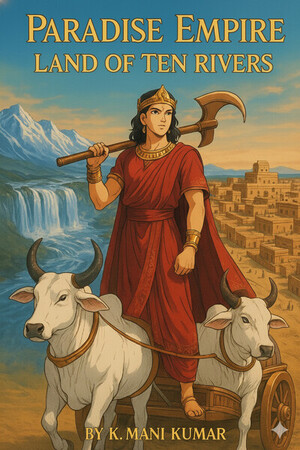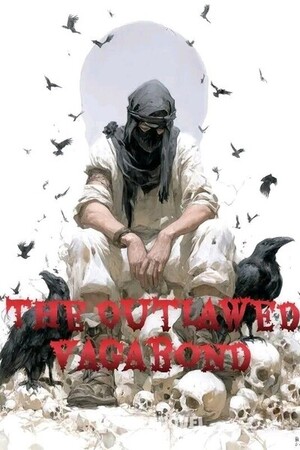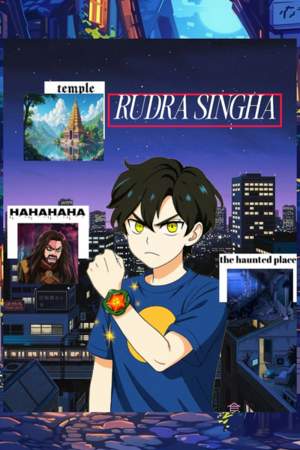Chapter 20:
Chapter 7: రాజ పట్టాభిషేకం (Rāja Paṭṭābhiṣēkaṁ) — The Royal Coronation Part 2: Surprise Arrival
The Paradise Empire: The Land of Ten Rivers season 1 part 1
Chapter 7: రాజ పట్టాభిషేకం (Rāja Paṭṭābhiṣēkaṁ) — The Royal Coronation
Part 2: Surprise Arrival
(Scene opens with)
The city was alive with a vibrant, chaotic energy. Waves of people, dressed in their finest festival clothes, moved through the streets like a river of color. The scent of camphor and roasting sweetmeats filled the air, signaling the start of the holy day.
At the edge of the Great Bath, Vīra, Tim’mayya, Rangayya, Kēsavu, and the other servants emerged from the holy water, dripping wet and shivering slightly in the cool morning breeze. They moved to the changing rooms. Today, there were no simple dhotis or travel-stained tunics.
Vīra unfolded the bundle he had been carrying with reverence. It was that same gift from Princess Nīlavēṇi. He slipped into the deep red silk dress, the fabric cool and heavy against his skin. He fastened the gold-bordered sash across his chest. Finally, he picked up the simple bronze circlet — the crown she had playfully placed on his head days ago — and set it upon his brow.
He stepped out into the courtyard.
Tim’mayya and Rangayya were already dressed in fine silks, but when they saw Vīra they stopped dead in their tracks. Kēsavu’s jaw dropped. The young man did not look like a farmer from Manūru anymore. He possessed an aura of regality, a quiet dignity that commanded the room.
Rangayya whispered, “By the ten rivers...”
Tim’mayya blinked, breaking the silence. He glanced at Rangayya; a mischievous grin spread across his face. He walked over to Vīra, circling him slowly before placing a heavy hand on Vīra’s shoulder.
“Look at him, Rangayya,” Tim’mayya teased, his voice booming with laughter. “Look at my cousin! He looks just like a lost prince of some unknown kingdom, finally returned home. Don’t you think?”
Vīra’s face flushed slightly. He adjusted the collar of his red robe. “Tim’ma! Stop it!”
The tension broke, and the room erupted in laughter. Rangayya, Kēsavu, and the servants joined in, the sound echoing off the stone walls.
“Happy Harvest Festival Day, my cousin!” Tim’mayya said, squeezing Vīra’s shoulder affectionately. “You look magnificent.”
Rangayya grinned. “Happy Festival Day. Today, we walk among kings.”
(Scene shifts)
They climbed onto the red sandalwood chariot. Vīra, Tim’mayya, and Rangayya took the main platform, while Kēsavu and the other servants piled onto the attached four-wheeled cart behind them.
Vīra snapped the reins. “Hah!”
The white bulls, decorated with painted horns and bells for the festival, moved through the crowded streets. The chariot rumbled over the cobblestones as they pressed into the heart of the city. Ahead, towering over the rooftops, they could see the Great Golden Gopuram of the temple, piercing the blue sky like a golden spire.
The streets were a tapestry of life. Vīra watched as children ran alongside the carts, laughing and playing games with sticks. Massive bonfires were being stacked with wood, ready for the evening prayers. Young men, stripped to the waist and glistening with oil, wrestled as they prepared for the yearly contest of strength. On the porches of houses, young women helped their mothers weave flower garlands, their laughter merging with the temple bells.
Families walked hand-in-hand — fathers lifting daughters onto their shoulders, mothers guiding sons. It was a scene of perfect unity.
Vīra watched them, and a sudden shadow passed over his eyes. The joy of the city reminded him of what they were missing — their home. He turned to Tim’mayya and Rangayya, his voice lowering so the crowds wouldn’t hear.
“We should have returned to the village,” Vīra said softly, a hint of melancholy in his tone. “We used to celebrate the festival just like this, with our parents and the villagers, every single year. But this year... we lost all of that. Because we didn’t go back.”
He looked down at his royal attire. “Sometimes I wonder... is this a curse? Or is it luck, as you say, Tim’ma?”
Silence hung between the three friends for a moment amid the noise of the festival. Then, simultaneously, Tim’mayya and Rangayya reached out and placed their hands firmly on Vīra’s shoulders.
“We are where we are meant to be, Vīra,” Rangayya said steadily. “Do not look back with regret.”
They arrived at the temple entrance. The crowd was dense — a sea of devotees. However, as soon as the temple guards saw the red dress and the company of the “Royal Friends,” they struck their spears against the ground and parted the crowd.
“Make way! Make way for the Royal Friends!”
The crowd parted for them — not because they were pushed, but because the people recognized the “Royal Friends.” People stepped aside, bowing their heads. Vīra and his friends walked past the long lines, feeling a mix of embarrassment and gratitude. They entered the inner sanctum and took the blessings of the God of Glory, Vīrayya, and the Goddess of Peace, Sāntam’ma. Because of their status, they received the Darshanam far earlier than they had thought possible.
(Scene shifts)
Just as they finished their prayers and stepped back into the courtyard, the atmosphere shifted. A thunderous drumbeat echoed from the main road.
And then —
BRROOOOOM!
The deep, earth-shaking sound of the Pēdda Kommu — the giant bronze horns — announced their arrival.
The Royal Family had arrived.
A massive royal bronze chariot, drawn by six magnificent white horses, thundered toward the temple. Elite soldiers in golden armor marched ahead, clearing a wide path with disciplined precision. It was a sight that mirrored the very first day Vīra had arrived in the capital — the overwhelming display of power and grace.
As the chariot slowed, Princess Nīlavēṇi scanned the crowd. Her eyes landed on the group standing near the temple entrance. She saw Vīra; her breath caught for a moment. The red dress suited him almost too well — the same dress she’d chosen for him, its fabric matching the flush on her own cheeks.
King Manirāja, Queen Rathnavallī, Princess Nīlavēṇi, and the soon-to-be king, Crown Prince Raghavendra, descended.
Princess Nīlavēṇi smiled — a genuine, radiant smile that seemed to outshine the sun.
Raghavendra, the King, and the Queen noticed her gaze and looked over, nodding in recognition at the boys. However, tradition dictated they first pay respects to the gods. The Royal Family descended and disappeared into the sanctum.
Meanwhile, Vīra, Tim’mayya, Rangayya, Kēsavu, and the servants wandered to the outer rim of the temple complex. They stopped at a familiar spot.
“Look,” Rangayya said, pointing. “This is where our stalls used to be.”
They looked across the street at the space where their stall had been just weeks ago. It was occupied by a sweet-seller now.
Rangayya sighed. “Our old life... gone just like that.”
Soon, the Royal Family emerged from the temple. Instead of boarding the chariot immediately, King Manirāja stood on the dais and addressed the thousands gathered.
“My beloved people!” the King’s voice boomed. “Today is a day of grand celebration. It is the Harvest Festival and the day my progenitor Dīrayya built this city, but it is also the day of the Rāja Paṭṭābhiṣēkaṁ — the Royal Coronation of your Prince, Raghavendra! I hope to see all my people at the Grand Complex outside the city for the ceremony!”
The crowd roared its approval.
Princess Nīlavēṇi leaned toward her brother, then looked directly at Vīra’s group. She waved. “Vīra! Come to the palace with us!”
The crowd gasped, turning to look at who the Princess was addressing. Vīra, Tim’mayya, and Rangayya looked at each other, stunned by the public invitation. They nodded, scrambling to their bullock chariot.
(Scene shifts)
The journey to the higher city was a blur of cheering crowds. They followed the six-horse chariot up the winding road, through the massive gates of the Royal Palace.
When they arrived at the grand courtyard, the Prince and Princess descended and immediately walked toward Vīra and his friends.
Princess Nīlavēṇi stopped right in front of Vīra, her eyes sweeping over his attire. “Welcome, my Prince,” she said softly, her voice teasing yet sincere. “You look stunning.”
Vīra bowed low, his heart racing. “All thanks to you, Princess. It is you who gave me this dress. Do you remember?”
“I remember everything,” she smiled.
Prince Raghavendra stepped forward, clapping Vīra on the back. “You are going to have a special surprise today, all of you. We will remain here in the courtyard to welcome the chiefs and minor kings. You should stand with us.”
“A surprise?” Tim’mayya whispered to Rangayya. “What kind of surprise?”
“I don’t know,” Rangayya whispered back. “But if the Prince arranged it, it will be big.”
(Scene shifts)
Soon, the guests began to arrive. The courtyard filled with the elite of the kingdom. Chiefs from the four towns, leaders of hundreds of villages, and high-ranking military officers streamed in. Princess Nīlavēṇi and Crown Prince Raghavendra received everyone with equal grace, bowing to the high and low alike.
Vīra, Tim’mayya, Rangayya, and Kēsavu stood off to the side, watching the procession with awe. They felt a swell of pride. To be standing here, as friends of the crown, was beyond their wildest dreams.
(Scene shifts)
Then, the atmosphere grew tense.
The four chiefs of Kīlūru, Lekūru, Avunūru, and Mūvūrū arrived. These were the men who had opposed Venkatayya during the contest years ago. They bowed stiffly to the Prince and Princess, then turned their gaze toward Vīra.
The Chief of Avunūru sneered. “What are you doing here?”
He looked at Rangayya. “We can understand why Rangayya is here. He is the son of Venkatayya of Manūru, a chief. But why are these sons of farmers — Vīra and Tim’mayya — and those dirty servants here?”
Rangayya stepped forward, his fists clenching. “Mind your tongue—”
Vīra placed a hand on Rangayya’s chest to stop him. Vīra looked calm. “We are Royal Friends, Chief of Avunūru. That is why we are here.”
The Chief of Avunūru scoffed, looking at the chiefs of Kīlūru, Lekūru, and Mūvūrū. “The farmer boy has bewitched the Royal Family of Maniyanūru itself! This is nothing new for him. He changed the old customs of the villages, and now he changes the customs of the court!”
Tim’mayya could not hold back. “Did you forget how our Vīra defeated all the players of your villages in every yearly contest? Where were your heads then, huh? Bowed in defeat!”
“Tim’ma, stop!” Vīra commanded.
The Chief of Avunūru narrowed his eyes. “Not this year, boy. Not this year.”
With that ominous warning, the four chiefs marched inside the palace hall.
Prince Raghavendra and Princess Nīlavēṇi, noticing the commotion, hurried over. “What is the matter?” the Prince asked. “Is something wrong?”
Vīra shook his head, forcing a smile. “It is nothing, my Prince. We were just... talking about the old days. Please, attend to the guests.”
The Prince and Princess nodded, though they looked concerned.
(Scene shifts)
The fanfare trumpets sounded again. The representatives of the Four Great Kingdoms had arrived: Girivūru, Īśvaranūru, Dharanūrū, and Sasyanūru.
They were dressed in silks of exotic colors, bearing gifts of gold and jewels.
Prince Raghavendra bowed. “Welcome. I had hoped the honorable kings, queens, princes, and princesses would come to my coronation personally.”
Princess Nīlavēṇi added, looking disappointed, “I thought I could see my royal brothers and sisters.”
The representative of Īśvaranūru bowed deeply. “Our royal families send their deepest regrets. They are currently occupied with urgent issues within their own kingdoms. But they send their blessings.”
“It is alright,” the Prince said graciously. “You may all go inside and meet my father, the King.”
As the dignitaries left, Nīlavēṇi turned back to Vīra and his friends. Her eyes were sparkling with excitement.
“Get ready,” she whispered. “Your surprise could come at any time.”
(Scene shifts)
At the very end of the procession, a humble convoy of carts appeared at the gates. They were the carts from the village of Manūru.
Rangayya squinted against the sunlight. “Wait... that is my father, Venkatayya! And my mother!”
But then, his eyes widened. Behind Venkatayya’s cart was another. And another.
“No...” Tim’mayya gasped.
“Mother? Father?” Vīra’s voice cracked.
Standing in the carts were Vīra’s parents and Tim’mayya’s parents. They looked overwhelmed, clutching their simple travel bags, staring up at the grandeur of the palace with wide, fearful eyes.
Vīra, Tim’mayya, and Rangayya didn’t wait for permission. They broke into a run.
“Mother! Father!”
They rushed toward the carts just as their parents climbed down. The Prince and Princess followed closely behind, watching with warm smiles.
Vīra collided with his mother and father, wrapping his arms around them. He hugged them tightly, burying his face in their shoulders, the scent of home washing away the stress of the palace.
For the first time since entering the capital, Vīra felt like a child again.
His mother pulled back, cupping his face. She looked at his silk dress, his bronze crown, his radiant appearance.
“My son...” she whispered, “look at you. How did you change so much? You look like a prince!”
Vīra laughed through his tears. “That is a long story, Mother. I will tell you later. But how are you here?”
Nearby, Tim’mayya hugged his parents. “We are so proud of you, son,” his parents said.
“As I told you before,” Tim’mayya beamed, wiping his eyes, “my cousin Vīra changed our lives!”
Rangayya bowed to his father Venkatayya and his mother.
“You managed everything well, Rangayya,” Venkatayya said with immense pride. “You will become a great village chief one day.”
Rangayya’s mother smiled warmly. Rangayya nodded, his eyes misting, and hugged them both.
Venkatayya then turned to Vīra and placed his hands together in respect. “There you are. The pride of Manūru.”
Vīra immediately bowed to touch Venkatayya’s and his wife's feet. “I am happy to hear that, my lord. But this is the greatest honor.”
“It is all because of you, Vīra,” Venkatayya said. “To be invited to the Royal Palace... it is a dream.”
Prince Raghavendra stepped forward. “I am the one who sent the royal letter ordering Venkatayya to bring your parents, Vīra. They will not just stand in the crowd. Your parents, and Tim'mayya's parents, are going to sit along with the minor kings, the village chiefs, and the elites.”
Vīra’s and Tim'mayya's parents gasped. “Us? Sit with the kings?”
Then something extraordinary happened.
Princess Nīlavēṇi stepped forward. She walked straight to Vīra’s parents. Without hesitation, the Princess of the Great Kingdom bent down and touched the feet of Vīra’s humble mother and father, seeking their blessings.
Vīra panicked. “Princess! What are you doing?”
Vīra’s parents shrank back, terrified. They tried to pull away, their hands shaking. “What is this? Your Divine Grace, please, do not touch our feet! It is a sin for us!”
“Don’t call me that,” Nīlavēṇi said gently.
She stood up, looked at Vīra with her striking blue eyes, a mysterious smile playing on her lips. She leaned in close to Vīra’s mother and whispered something into her ear.
“Daughter-in-law.”
Vīra’s mother froze. Her eyes went wide. She looked at the Princess, then at Vīra, then back to the Princess. A look of utter shock melted into a beautiful, knowing smile.
Vīra frowned. “What? What did you just...?”
Nīlavēṇi giggled, closing one eye in a playful wink. “That is a secret.”
She took Vīra’s hand boldly in front of everyone. She looked at his parents. “I am taking your son with me now.”
Vīra’s parents nodded enthusiastically, their hands folded in prayer and gratitude. “Take him, Princess. Take him.”
“Come with me, my Prince,” she said to Vīra.
Vīra didn’t understand anything, but he followed her quietly.
Prince Raghavendra addressed the group. “All of you, please go inside and take some rest. The Rāja Paṭṭābhiṣēkaṁ will happen within a few hours, at the auspicious Muhurtam at the Great Complex.”
Everyone bowed. Tim’mayya and Rangayya began eagerly explaining the palace wonders to their parents as they walked inside. Venkatayya and his wife walked tall, proud of their son and their village.
As they entered the great hallway, Vīra’s mother and father looked at each other. They were still trembling slightly from the whisper.
“Did you hear that?” Vīra’s father whispered.
“I heard,” his mother replied, clutching her chest. “She called herself... our daughter-in-law?”
The sun reached its zenith over the golden city. The drums began to beat louder. The Rāja Paṭṭābhiṣēkaṁ — the Royal Coronation — was about to begin.
(End of Chapter 7 part 2)




Please sign in to leave a comment.